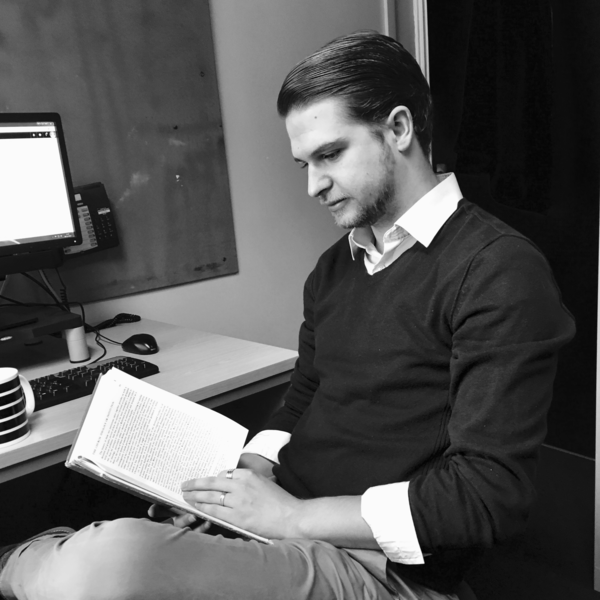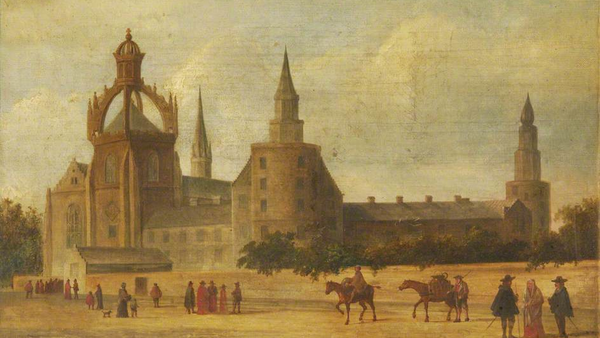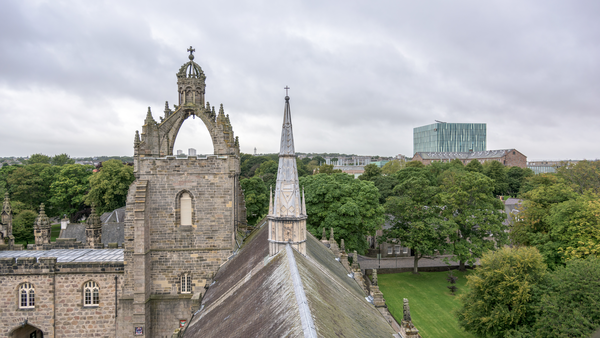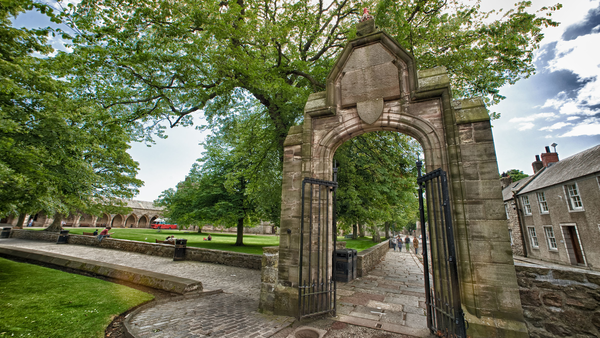Jared Thomley, Minnesota United States of America

Explore the historical and cultural connections between the North-East of Scotland, Pre-Modern Europe, and the global world. Examine the Medieval and Early Modern periods to understand the fundamental changes that connect the modern world with its past. Tailor your degree through diverse topics delivered by experts across specialisms and access historical archives dating back to the 15th century to advance your learning or career aspirations.
The MLitt enables an interdisciplinary approach to exploring medieval, renaissance, and early modern periods to discover the historical developments in art, literature, the built environment, technologies, practices, belief systems, music, society and more.
We deliver diverse topics from specialisms in art history, Celtic culture, church history and theology, languages, legal history, philosophy, and Scottish and Irish studies, giving the flexibility to tailor the degree to your learning or career aspirations. Our world-class academics teaching the programme offer unrivalled expertise and knowledge, with links to researchers and specialists abroad. We also provide personal reading courses and supervisors with varied specialisms to support your research interests.
At Aberdeen, a lively research community welcomes you. We host an annual postgraduate training weekend for students to collaborate and engage in research at the 18th-century estate in the Scottish countryside, The Burn. You can also participate in student seminars and projects through our various research centres, such as the Centre for Early Modern Studies (CEMS), the Research Institute of Irish and Scottish Studies or the Centre for History and Philosophy of Science, Technology and Medicine.
You have access to the Museum and Special Archives Collections dating back to the 15th Century, giving you excellent opportunities to exercise your research skills by analysing and interpreting art, objects, and unedited literary and archival sources. These historical treasures include the specialist collections on the early modern history of science and medicine, the MacBean Stuart and Jacobite Collection, the UNESCO UK recognised Aberdeen City and Aberdeenshire Archives, the Scottish Catholic Archives, and private estate papers from the early modern period in North-East Scotland and its networks in the North Sea and Baltic world, offering a broad insights into the historical and cultural changes.
You can choose to study for a:
This course, which is prescribed for all taught postgraduate students, is studied entirely online, takes approximately 5-6 hours to complete and can be taken in one sitting, or spread across a number of weeks.
Topics include orientation overview, equality and diversity, health, safety and cyber security and how to make the most of your time at university in relation to careers and employability.
Successful completion of this course will be recorded on your Enhanced Transcript as ‘Achieved’.
Select 60 credit points from the following options:
15 Credit Points
A postgraduate student of medieval and early modern history or literature often needs to be able to use unedited literary and archival sources, or to check the completeness and accuracy of existing editions. Medievalists often need to consult material available only in later copies, extracts and antiquarian notes. To do so, you must be able to read pre-modern scripts. This course is designed to give students the necessary skills to use manuscript sources for themselves, whatever their date, describe manuscripts, and transcribe texts. Assessment is by exercises and a final essay.
30 Credit Points
This course allows you to participate in lectures and seminars for a specialist upper-level undergraduate (Honours) course in History or a neighbouring discipline, with tailored postgraduate-level research and assessment methods. The course is open to students on any of the campus-based PGT programmes in History, and you are able to choose the option that best suits your interests and programme, in consultation with your programme coordinator.
Example courses, from a wide range available each year, include: History of the Israeli-Palestinian Conflict; The Scottish Wars of Independence, 1286-1328; Britain and Revolutionary Russia 1917-1924; The Black Radical Tradition; Myths of the North; Enlightenment Compared: Ireland, Scotland, Central Europe.
30 Credit Points
Students work closely with a member of staff to develop a detailed knowledge of and write a critical survey of the literature in their chosen field. This helps students develop research skills required for the literature review in the dissertation, but will be much broader in scope to ensure they have a secure grasp of the relevant research in their field. The course enhances students' ability to identify and engage critically with a body of literature and improve their skills in academic writing appropriate to postgraduate work.
30 Credit Points
This core course is aimed at providing an introduction for students who have chosen the MLitt in Medieval and Early Modern Studies and want to study the Renaissance and early modern period from around 1450 to 1750 through a variety of interdisciplinary approaches.
30 Credit Points
This course allows you to define and explore a specialised research topic of your choosing. You will work one-on-one with an expert supervisor to develop a sustained line of inquiry and tailored bibliography. Regular meetings with your supervisor allow for in-depth discussion of your reading, culminating in an extended research essay in your chosen area.
15 Credit Points
Latin 1 is an introductory, intensive course for those with little or no previous exposure to Latin. Students completing this course should have a Latin vocabulary of about 400 words and a basic understanding of Latin grammar and syntax. Students successfully completing this course will be adequately prepared to attend Latin 2. Students will very likely discover that their knowledge of English vocabulary and grammar/syntax is improved by their study of Latin. The etymological roots of many English words can be traced to the Latin language.
30 Credit Points
This core course is aimed at providing an introduction for students who have chosen the MLitt in Medieval and Early Modern Studies and want to study the Renaissance and early modern period from around 1450 to 1750 through a variety of interdisciplinary approaches.
Select 60 credit points from the following options:
Note: Students may, at the discretion of the programme coordinator, substitute up to 60 credits from the above courses with other courses offered within the University, including other Level 5 courses in History or other neighbouring disciplines.
Students with appropriate proficiency in Latin or students intending to do a dissertation on a topic not requiring Latin may take alternative non-Latin courses from the list of electives, in consultation with the programme coordinator.
15 Credit Points
This course consists of a mixture of two-hour group seminars and shorter supervision meetings with the member of staff best equipped to advise you on your dissertation topic. It will involve detailed discussion of your research ideas and planning with the aim of providing the fullest preparation for researching and writing the dissertation in the summer and research beyond. Fundamental to the success of the course are mutual feedback and support within the student group.
15 Credit Points
This course allows you to pursue a specific, tailored line of study related to your postgraduate degree programme. Expert, one-on-one supervisory support will guide your project as you develop independent research skills and specialist knowledge, culminating in a concise research essay in your chosen area.
30 Credit Points
This course allows you to participate in lectures and seminars for a specialist upper-level undergraduate (Honours) course in History or a neighbouring discipline, with tailored postgraduate-level research and assessment methods. The course is open to students on any of the campus-based PGT programmes in History, and you are able to choose the option that best suits your interests and programme, in consultation with your programme coordinator.
Example courses, from a wide range available each year, include: History of the Israeli-Palestinian Conflict; The Scottish Wars of Independence, 1286-1328; Britain and Revolutionary Russia 1917-1924; The Black Radical Tradition; Myths of the North; Enlightenment Compared: Ireland, Scotland, Central Europe.
15 Credit Points
What is an archive and how can it be used? Students are introduced to some archives in Aberdeen and learn how to make best use of these important resources for research. Seminars investigate the history and philosophy of archival collections, and how they relate to museums, libraries and galleries; approaches to the evaluation of contents of archives and qualitative analyses of specific collections. Assessment is based on a 5000-word essay in which students are asked to identify and analyse material from a specific archive which may be in Aberdeen, or elsewhere in Scotland, the UK, or abroad.
30 Credit Points
Students complete the course with an enhanced ability to present convincing academic arguments and research findings in writing and, particularly orally. They improve their critical engagement with the research and arguments of other historians.
Students attend research seminars and write a seminar comparison report, fostering engagement with the process of presenting arguments and research findings.
Following training in presentation skills, students present their dissertation proposals in a workshop, recording their presentation using Camtasia, and respond to questions from staff and students. Students then write a reflective analysis of their presentations.
30 Credit Points
This course allows you to define and explore a specialised research topic of your choosing. You will work one-on-one with an expert supervisor to develop a sustained line of inquiry and tailored bibliography. Regular meetings with your supervisor allow for in-depth discussion of your reading, culminating in an extended research essay in your chosen area.
15 Credit Points
History has long had a high profile in literature, film and television; its presence has expanded exponentially in the digital age, with a vast range of new historically-based websites, computer games, and blogs. This course will consider the use of history and historical themes in literature, film, and television. In an age claimed to be post Truth, it will consider the dividing-line between fiction and history, the problems of historical authenticity and artistic licence, and the use and misuse of history by politicians and other public figures.
15 Credit Points
Latin 2 picks up where Latin 1 finished in first term. By the end of this course students should have a more or less comprehensive understanding of Latin syntax and grammar, a Latin vocabulary of 700-800 words, and should be capable of translating simple Latin texts into idiomatic English. Students will very likely discover that their knowledge of English vocabulary and grammar/syntax is improved by their study of Latin.
In addition to the 120 credit points taken in the above courses, students take the following according to their degree intention:
MLitt (180 credits):
HI5917 Dissertation in Historical Studies (60 credit points) OR
Assessment: Normally by a variety of forms of continuous assessment. The degree of MLitt shall not be awarded to a candidate who fails to achieve CGS grade of D3 or above in the Dissertation, irrespective of their performance in other courses.
PgDip (120 credits):
The PgDip is available to a student with 120 credits in courses. There is no dissertation.
PgCert (60 credits):
The PGCert is awarded to students who passed 60 credits. There is no dissertation.
60 Credit Points
An individually supervised project with a 15,000-word dissertation for students to complete their MLitt qualification
We will endeavour to make all course options available. However, these may be subject to change - see our Student Terms and Conditions page.
| Fee category | Cost |
|---|---|
| EU / International students | £22,000 |
| Tuition Fees for 2025/26 Academic Year | |
| UK | £10,000 |
| Tuition Fees for 2024/25 Academic Year |
Grants and scholarship
The James Carnegie maintenance scholarship for postgraduate students is available with this degree.
Self-funded international students enrolling on postgraduate taught (PGT) programmes will receive one of our Aberdeen Global Scholarships, ranging from £3,000 to £8,000, depending on your domicile country. Learn more about the Aberdeen Global Scholarships here.
To see our full range of scholarships, visit our Funding Database.
You must acquire 180 credits over the year (120 for courses + 60 for the dissertation) to obtain the master's degree qualification. Courses usually should total 45-60 credit points in each half-session. Assessment is based on written work and moderated according to university standards. You are assigned a dissertation supervisor based on your research interests.
For more information about the application process, including details about which supporting documents you will be asked to provide, please click here.
The information below is provided as a guide only and does not guarantee entry to the University of Aberdeen.
You must normally have an Honours degree to at least 2.1 standard in an appropriate discipline or equivalent qualifications and experience.
Please enter your country to view country-specific entry requirements.
To study for a Postgraduate Taught degree at the University of Aberdeen it is essential that you can speak, understand, read, and write English fluently. The minimum requirements for this degree are as follows:
IELTS Academic:
OVERALL - 6.5 with: Listening - 5.5; Reading - 6.0; Speaking - 5.5; Writing - 6.0
TOEFL iBT:
OVERALL - 90 with: Listening - 17; Reading - 21; Speaking - 20; Writing - 21
PTE Academic:
OVERALL - 62 with: Listening - 59; Reading - 59; Speaking - 59; Writing - 59
Cambridge English B2 First, C1 Advanced or C2 Proficiency:
OVERALL - 176 with: Listening - 162; Reading - 169; Speaking - 162; Writing - 169
Read more about specific English Language requirements here.
You will be required to supply the following documentation with your application as proof you meet the entry requirements of this degree programme. If you have not yet completed your current programme of study, then you can still apply and you can provide your Degree Certificate at a later date.
Eligible self-funded postgraduate taught (PGT) students will receive the Aberdeen Global Scholarship. Explore our Global Scholarships, including eligibility details, on our dedicated page.
Aberdeen Global ScholarshipsWhat can I do with a history degree?
A degree in history can open a range of career paths to complement your skills and build your confidence in the workplace. These roles include and are not limited to:
You develop core skills in research, critical reasoning, interpersonal communication, problem-solving and analytical thinking, offering you opportunities to work across different industries or pursue doctoral studies.
Our degree provides ideal preparation for doctoral studies and equips you with applied skills for work in museums, archives, education, and media. Graduates have also progressed onto roles in teaching, the government, public services, journalism, business, and academia.
Our academic staff have diverse specialisms across disciplines in literature, philosophy, art history, medicine, history, music, and law, offering you the flexibility to study topics that interest your vocation.
You will be taught by a range of experts including professors, lecturers, teaching fellows and postgraduate tutors. However, these may be subject to change - see our Student Terms and Conditions page.
We have a range of research centres led by academic experts and researchers in their respective fields. The centres support collaborations between scholars across other disciplines within and outside the university.

The Centre for Early Modern Studies specialises in exploring late medieval and early modern culture, offering a collaborative space for scholars and students to engage in research events, seminars, workshops, and conferences to understand the era.
Find out more
The Centre focuses on teaching, engaging, and researching the history, philosophy and ethics, literature and museology of science, technology, and medicine.
Find out more
The Centre focuses on teaching, engaging, and researching the history, philosophy and ethics, literature and museology of science, technology, and medicine.
Find out more